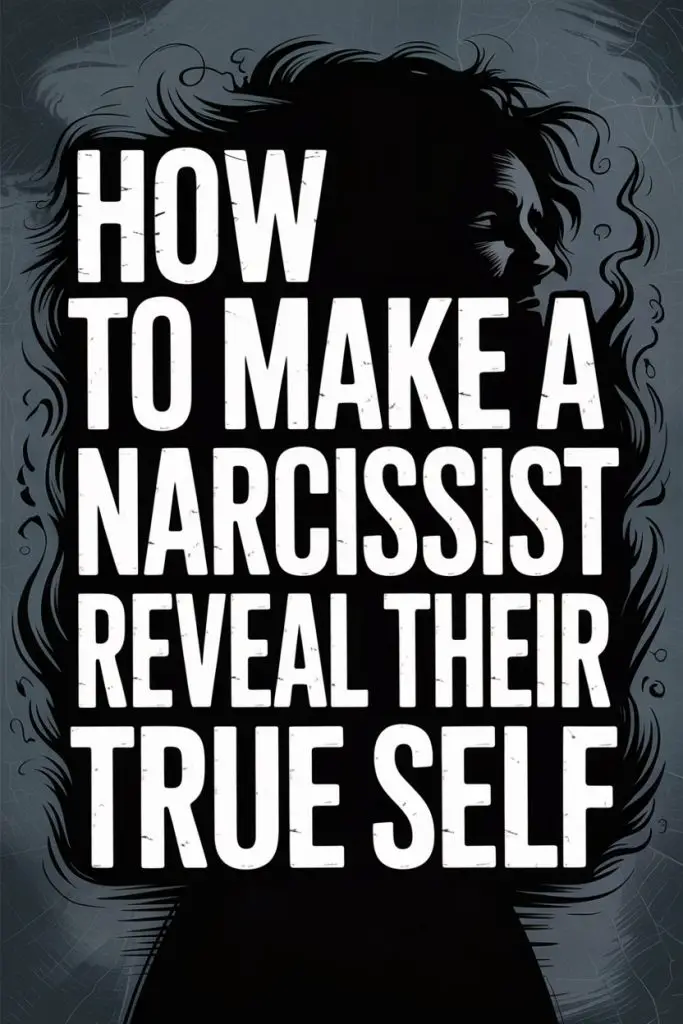Everyone knows at least one: the dazzling charmer, the life of every party, the expert in humblebragging—until you notice it’s always about them.
If you suspect someone in your orbit might be hiding a grandiose ego behind a carefully curated mask, you’re not alone.
Getting a narcissist to show their true self is a bit like persuading a cat to do the dog’s job: it requires patience, a strong sense of self-preservation, and the ability to resist being hypnotized by a killer smile.
Ready to see behind the curtain? Let’s get into the nitty-gritty of coaxing the real deal out into the open.
Spotting the Mask: Why Narcissists Hide Their True Selves
Most narcissists have spent years perfecting an image that’s shinier than a freshly waxed sports car.
They’re skilled at saying just what people want to hear, mirroring your interests (oh, you love hiking? Suddenly, they’re the Bear Grylls of suburbia), and doling out compliments that feel tailor-made.
All this is intentional. Narcissists thrive on admiration, so their “best self” is really just a carefully constructed performance. Think of it as a social media highlight reel, but in real life.
The result? When conflict, criticism, or vulnerability threatens their façade, a very different version can slip out—one that’s far less charming.
Why You Might Want the Truth, Anyway
It’s not about catching someone out for sport. Relationships—romantic, familial, or professional—depend on honesty.
Trying to love, trust, or even negotiate with someone stuck in performance mode is exhausting (and, let’s be honest, a little soul-sucking).
When you see the real person underneath, you finally know what you’re dealing with. No more guesswork, no more tiptoeing. Just reality, warts and all.
The Golden Rule: Stay Calm and Watch Closely
The quickest way to see a narcissist’s true colors? Upset the script. But before tossing a metaphorical grenade into the conversation, keep your cool.
Narcissists are masters of emotional hot-potato, flinging blame and drama at the nearest target. The less you react, the clearer things become.
Maintain a steady, neutral tone. No raised voices, no dramatic sighing, no Oscar-worthy tears. It’s not about “winning”; it’s about observing.
Setting Boundaries Like a Pro
Nothing rattles a narcissist like hearing “no.” Set a simple, reasonable boundary—and stick to it. For example: “I need some time to myself tonight.” Or, “I’m not comfortable sharing that.”
Watch their reaction.
Genuine folks may be disappointed but will respect your wishes. Narcissists, on the other hand, often bristle at boundaries: expect guilt trips, sudden neediness, or a tirade about how you’re selfish/ungrateful/a huge disappointment.
When the mask slips, it’s usually because someone dared to put up a fence.
Ask Questions That Require Vulnerability
Questions that cut through the surface (“How did that make you feel?” “What’s your biggest fear?”) tend to provoke one of two things in a narcissist: blank stares or wild deflection.
Emotionally intimate topics are like kryptonite—watch how they squirm, get grandiose, or suddenly develop amnesia about their own childhood.
Don’t expect heartfelt confessions. The goal here is to spot the evasiveness, the exaggerated answers, and the rush to change the subject. It’s less Dr. Phil, more Sherlock Holmes.
Withhold Narcissistic Supply
Praise, attention, validation—these are oxygen for a narcissist. Try pulling back, even a little, and see what happens. A secure person shrugs it off.
A narcissist? Expect anything from theatrical pouting to unsolicited monologues about their amazingness.
Silence speaks volumes. The person who suddenly can’t stand being ignored, who turns up the drama or starts calling you names, is giving you a glimpse of the neediness behind the façade.
Challenge the Double Standards
Ever noticed how the rules are different for them? Point it out, gently: “I noticed you got upset when I was late, but you were late yesterday too.” Or, “You expect me to listen to your work stories, but you change the subject when I talk about mine.”
Typically, this is met with one of three responses: denial, blame-shifting, or a magically invented excuse. The inability to tolerate fair play says more about them than a thousand Instagram posts ever will.
Watch Their Reaction to Criticism
No one loves criticism, but narcissists treat it as a personal attack. Offer a small, constructive suggestion (“Hey, maybe next time, give me a heads up if you’ll be late?”), and brace yourself.
You might get rage, tears, or a defensive lecture about your own flaws.
The inability to handle the slightest imperfection? Textbook narcissism. Also, exhausting.
Observe Relationships with Others
Pay attention to how they treat people who can’t “give” them anything: waitstaff, retail workers, the neighbor’s kid. When the spotlight isn’t on, real personalities leak out around the edges.
If kindness evaporates the minute admiration isn’t guaranteed, you’re getting an unfiltered look at what’s underneath.
Don’t Try to Fix or Diagnose
Tempting as it is to break out your unofficial therapy license, resist. Narcissists rarely respond well to being called out or psychoanalyzed.
Announcing, “I think you’re a narcissist!” is more likely to trigger a dramatic monologue than a self-reckoning.
Stick to what you can see and feel: “It hurts when you talk to me that way.” Speak plainly. The goal isn’t to change them—it’s to see them.
Keep Evidence of Patterns
It’s easy to second-guess yourself when someone is gaslighting you. Keep a diary or jot down incidents that strike you as odd—broken promises, mood swings, charming one day and icy the next.
Patterns are hard to ignore once you see them in black and white. When confusion creeps in, look at the evidence. Was that apology genuine, or just another chapter in the same old story?
Watch for the Narcissistic Collapse
Occasionally, the mask falls off completely—usually when something (or someone) threatens their image or control. Watch for dramatic meltdowns, wild accusations, or sudden withdrawals.
These aren’t “bad days.” This is what happens when the performance can’t be maintained.
It’s not pretty, but it’s real.
What to Do When You See the Real Person
Unveiling a narcissist’s true self can be equal parts illuminating and disheartening.
Maybe you’re relieved. Maybe you feel like you need a long shower and a strong cup of tea. Either way, now you know.
Decide what’s next for you. Sometimes that means limiting contact, setting tougher boundaries, or (when safe and possible) moving on altogether.
There’s no medal for putting up with bad behavior. Save your energy for people who meet you halfway—no spotlight needed.
When the Costume Comes Off
Unmasking a narcissist is less about catching them in the act and more about trusting your gut. If the dazzling stage persona never quite matches their behavior when the audience is gone, believe what you see.
The real magic? Protecting your peace, honoring your own needs, and refusing to audition for a role in someone else’s one-man show.
The truth, while rarely comfortable, is always the beginning of something better.


